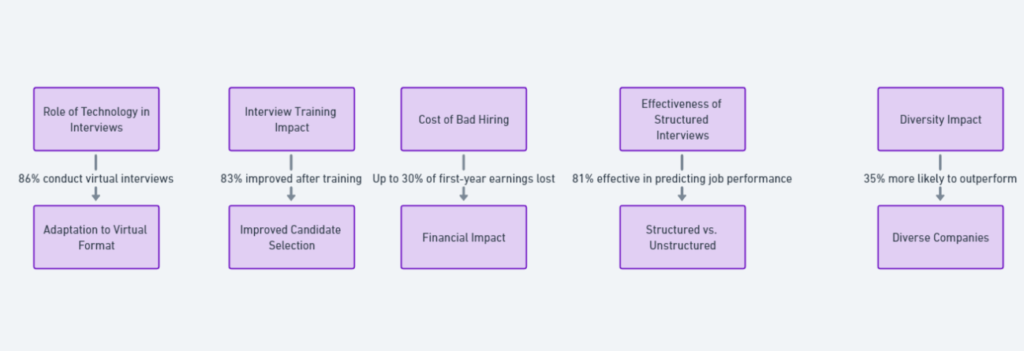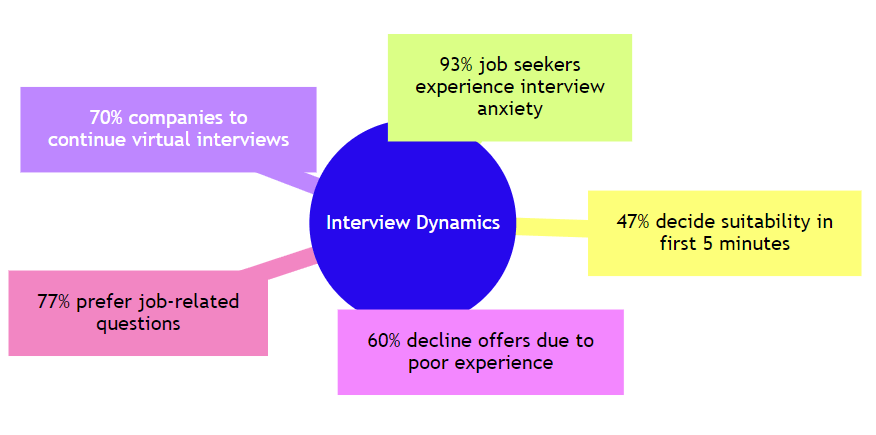We often think of interviews as an opportunity for interviewees to audition for jobs, but it’s important to remember that interviews are also a chance for the company to show the interviewee that the company is an exciting employment opportunity. The questions you ask are an important part of showing your interviewee that you’re competent, professional, and an interesting company to work for.
Effective job interview techniques for employers refer to strategies and practices that interviewers use to assess candidates fairly while presenting the company positively. The evolution of job interviews has moved from a one-sided assessment to a more interactive, candidate-focused approach, considering aspects like cultural fit and emotional intelligence. These techniques are crucial for attracting top talent, reducing turnover, and enhancing the company’s reputation.
In addition to viewing interviews as a mutual opportunity, it’s crucial to emphasize the significance of a positive candidate experience. Data shows that 83% of candidates may turn away from a role or company they once liked due to a negative interview experience. This highlights the interviewer’s role in not just evaluating but also attracting talent
Why It’s Important to Ask the Right Interview Questions
- Getting the Best Talent: If an interview is not good, great candidates might not want to work for the company. It’s hard and costs a lot to find someone else to do the job, and if a company loses someone who’s really good, it can slow down their work and stop new ideas.
- Making a Good Impression: Bad interviews can make a company look bad, and then it’s harder to get other good people to apply for jobs there. Nowadays, people looking for jobs really care about how the interview process feels.
- Being Fair to Everyone: If interview questions are biased or unfair, they can make it hard for some people to get a fair chance. This can make it difficult for a company to have a team with people from different backgrounds and experiences.
- Doing Interviews the Right Way: Interviews should be fair and treat everyone equally. This means every person who applies for a job should have the same chance to show their skills and what they know.
So what are the interview questions that will turn away your top candidates?
Brain Teasers and Odd-ball Questions
In a time when businesses needed to try and guess which potential employees might perform best in a high powered role, sometimes one that was still being developed, it became fashionable to ask questions like “how much profit does the New York Philharmonic make in a year,” or “If you can only take three items to a desert island, what would they be?”
While interviewers at the time thought that these sorts of questions would help to show the most creative employees, everyone now accepts that first, the correct strategies for answering these sorts of oddball questions are readily available online, and that the sort of creative thinking that allows a person to respond properly to these questions doesn’t actually link to higher intelligence or job success.
Asking brain teasers in an interview shows you as at best, out of date, and at worst, actually out to irritate your applicants.
The Downside of Hypothetical Scenario Questions
Hypothetical scenario questions in job interviews, like “How would you handle a project that’s destined to fail?” or “Imagine you’re leading a team that disagrees with your strategy, what would you do?”, often aim to assess a candidate’s problem-solving and critical thinking skills. Yet, these questions can fall short in realistic assessment and sometimes intimidate even the most competent candidates. The downside is they often don’t relate directly to real-life job scenarios, leaving candidates to navigate abstract situations that may never occur. This can lead to discomfort and a failure to showcase actual abilities.
Realistic alternatives to hypothetical questions can be more effective. Instead of asking, “If you discovered a colleague doing something unethical, how would you react?”, a more grounded question would be, “Can you share an experience where you faced an ethical dilemma at work and how you addressed it?” This shift from hypothetical to experiential questions allows candidates to draw from real-life examples, giving interviewers a clearer view of their decision-making process and ethical standards in actual workplace situations.
To construct relevant and realistic hypothetical scenarios, interviewers should use a framework rooted in the job’s actual responsibilities. Begin with a solid understanding of the role’s challenges and daily tasks. Develop scenarios based on these, ensuring they are plausible and directly relevant to the position. For instance, for a marketing role, instead of asking, “How would you market a product in a completely new world?”, ask, “Given our current product line, how would you approach creating a campaign for a new target demographic?” This approach not only assesses the candidate’s job-specific skills but also demonstrates the interviewer’s understanding of the role, fostering a more meaningful and engaging discussion.

Questions with Yes/No Answers
Hiring pieces of training have been singing the praises of open-ended questions for more than two decades, but interviewers still ask questions like “Have you ever done xyz at work?”
Open-ended questions succeed because they invite the interviewee to give you more information, talking about a strategy they used to succeed, or a time they overcame a weakness. In most situations, you end up learning more about the candidate by how they answer than about what they actually say. Do they understand the question? Are they able to turn the conversation so that they show themselves in a favorable light? Do they accidentally reveal something negative about themselves? How do they respond when you point that out?
Sure, it’s possible to ask a follow-up question to a yes/no question that gets more information (“tell me more about that” if the interviewee says yes, “how do you think you’ve been able to avoid that” if they say no), but far too few interviewers take that opportunity. If you’re asking a yes/no question without a planned follow-up, you’re wasting both your time, and the interviewee’s.
Navigating Questions Around Work-Life Balance
In the modern work environment, the concept of work-life balance has become increasingly significant. Interviewers must approach this topic delicately, as mishandling it can deter top candidates. The key lies in framing questions positively to reassure candidates about the company’s commitment to employee well-being. For instance, instead of asking, “Do you mind working overtime frequently?”, a more positive approach would be, “How do you manage professional responsibilities while maintaining personal well-being?” This shift in phrasing not only removes the assumption of overwork but also invites candidates to share their strategies for achieving balance, offering insights into their time management and prioritization skills.
Innovative ways to discuss work-life balance, aligning with modern workplace trends, involve focusing on flexibility and support. Questions like, “Can you give an example of how you’ve adapted to changing work demands while managing personal commitments?” emphasize adaptability and resilience. This type of inquiry respects the candidate’s ability to navigate work and personal life effectively. Additionally, discussing company policies that support work-life balance, such as flexible hours, remote work options, or wellness programs, can be woven into the conversation.
This not only informs the candidate of the benefits available but also demonstrates the company’s proactive stance on fostering a supportive work environment. By addressing work-life balance in this manner, interviewers can effectively communicate the organization’s values and commitment to employee well-being, making it an attractive option for top talent.
Questions That Take Too Long To Ask
When you’re interviewing someone, you should only be talking about 10% of the time; the rest of the time, the candidate should be responding to questions. This means that your questions need to be brief, to the point, and understandable. If you have to spend twenty minutes explaining why you’re asking the question or employment perks, it’s probably not right for an interview. Condense it and move forward.
Efficiency in questioning is key. A Journal of Business and Psychology study shows that concise questions elicit more genuine responses. Preparing brief, targeted questions in advance focuses on key competencies and experiences relevant to the role.

Questions That Aren’t Questions
Too many interviewers ask leading questions, questions which too clearly telegraph the answer that the interviewee is supposed to give. When an interviewer asks someone to tell them a joke, for example, everyone knows that they’re looking to see whether or not the candidate will tell an off-color or questionable joke.
If you’re trying to trick the candidate with a question, it’s a bad question. Interviews should be an authentic exchange of information where the candidate and company try to get to know each other and establish whether or not they’ll be a good fit. You can’t do that when you’re trying to trick someone.
Impact of Cultural Fit Questions on Candidate Perception
Interview questions designed to gauge cultural fit can be a double-edged sword, often determining how candidates perceive the company. If not carefully crafted, these questions may inadvertently alienate talented individuals who could otherwise have been a great asset. It’s essential to strike a balance between assessing a candidate’s alignment with the company’s values and culture, and respecting their individuality and diversity.
For example, a poorly framed question like “Do you enjoy after-work social events?” could imply a compulsory socializing culture that might not sit well with everyone. Instead, an inclusive and thoughtfully structured question such as “Can you share how you contribute to a positive work environment?” respects individual preferences and focuses on the candidate’s ability to foster a supportive and collaborative workplace. This type of question gives candidates the freedom to express their unique ways of contributing to a positive work atmosphere, whether through teamwork, innovation, or communication skills, without assuming everyone expresses their professionalism in the same way.
Moreover, questions about cultural fit must avoid being narrow or leading. Asking “How do you handle conflict?” rather than “Do you avoid confrontations at work?” allows candidates to demonstrate their conflict resolution skills without presuming that avoiding conflict is the preferred or only method. This not only respects diversity in problem-solving approaches but also gives insights into the candidate’s interpersonal skills and adaptability.
Effectiveness of Past Behavior Questions Over Predictive Queries
Past behavior questions focus on a candidate’s previous experiences, while predictive queries attempt to gauge how a candidate might act in future scenarios. Both have their place in an interview, but they offer distinct insights into a candidate’s potential.
Pros and Cons of Past Behavior Questions and Predictive Queries
Past Behavior Questions: These questions are based on the premise that past behavior is the best predictor of future performance. For example, asking “Can you describe a challenging project you managed and how you ensured its success?” allows candidates to showcase their problem-solving skills and resourcefulness based on real-life experiences. This approach offers concrete evidence of a candidate’s capabilities and how they’ve navigated past professional challenges. However, it might not always reveal how a candidate will adapt to the unique challenges of your organization or evolve in new and unforeseen situations.
Predictive Queries: On the other hand, predictive queries like “How would you approach a new market strategy for our product?” attempt to assess a candidate’s future potential and innovative thinking. This approach can unveil a candidate’s ability to strategize and adapt to hypothetical situations. However, the downside is that these questions rely heavily on speculation and may not accurately reflect the candidate’s real-world abilities or past achievements.
Crafting Effective Past Behavior Questions
To formulate insightful yet non-intrusive past behavior questions, consider the following guidelines:
- Align with the Role: Ensure that the questions are directly related to the key responsibilities and challenges of the position. For a sales role, for example, you might ask, “Can you tell us about a time when you turned a no into a yes?”
- Seek Specifics: Encourage candidates to delve into details. A question like, “Describe a situation where you had to work under tight deadlines,” prompts candidates to provide specifics, which helps assess their real-world skills.
- Balance: While focusing on past experiences, it’s beneficial to incorporate questions that give insights into a candidate’s learning and growth. For instance, “What did you learn from a project that didn’t go as planned?”
- Respect Boundaries: Avoid overly personal questions or those that might make candidates uncomfortable. Keep the focus on professional experiences and achievements.
- Follow-up for Clarity: If a response is vague, ask follow-up questions to gain a clearer understanding of the candidate’s experience and skills.
Disorganized Questions
There’s nothing quite as demoralizing as someone who is holding your resume, asking you to tell them about the last three jobs you’ve had. It reveals that they haven’t prepared for the interview, which conveys that they don’t particularly care about what you have to say or what you’re feeling.
Preparation is crucial for interviewers. According to a survey by the Society for Human Resource Management, well-prepared interviewers are 40% more likely to select the right candidate. Use structured interview techniques with standardized, job-relevant questions for a fair and efficient process.
Role of Non-verbal Communication in Deterring Candidates
The unspoken language of non-verbal communication often speaks volumes in an interview setting, impacting a candidate’s perception and interest in a role. Studies in organizational behavior highlight how an interviewer’s body language, such as eye contact, posture, and facial expressions, can significantly influence a candidate’s experience. For instance, lack of eye contact might be interpreted as disinterest, while a relaxed posture can convey openness and create a welcoming atmosphere. Interviewers should be aware that their non-verbal cues are just as critical as the questions they ask.
To this end, it’s beneficial for interviewers to conduct a self-assessment of their non-verbal communication. A simple checklist can be an effective tool in this process. Are you maintaining appropriate eye contact, or does your gaze wander, potentially giving the impression of disinterest? Consider your posture; leaning forward slightly can indicate engagement, while crossed arms might suggest a closed-off attitude. Facial expressions also play a crucial role; a friendly, attentive expression can make candidates feel at ease. It’s crucial to balance professionalism with approachability.
Take note of your gestures; they should complement your words, not distract from them. By fine-tuning these aspects of non-verbal communication, interviewers can create a more positive, engaging, and inclusive interview environment, encouraging candidates to see the company in a favorable light.
Addressing the Bias in Skill-Testing Questions
Skill-testing questions are a staple in job interviews, but they often come with hidden biases that can skew the fairness of the selection process. To ensure that these questions serve their intended purpose without unfairly disadvantaging certain candidates, it’s crucial to approach them with careful consideration. Imagine you’re a candidate from a diverse background, facing a skill-testing question that seems irrelevant to your experiences or expertise.
This can be disheartening and may even lead you to question the inclusivity of the organization. Therefore, it’s essential for interviewers to craft these questions in a way that genuinely assesses relevant skills while maintaining equity.
Here’s a checklist to guide you in formulating equitable skill-testing questions:
- Relevance to the Role: Ensure each question directly relates to the skills and knowledge necessary for the job. For example, if you’re hiring for a programming role, ask about coding challenges they’ve faced rather than abstract mathematical problems.
- Cultural Neutrality: Avoid questions that assume a specific cultural or educational background. This means steering clear of references that may be unfamiliar to people from different backgrounds.
- Clear and Concise Wording: Use straightforward language to avoid confusion. Complex wording can disadvantage non-native speakers or those with different educational backgrounds.
- Avoid Stereotypes: Ensure questions don’t reinforce gender, age, or cultural stereotypes. For instance, avoid assuming a candidate’s interest or expertise in a particular area based on their background.
- Diverse Perspectives: Consider how different people might approach a problem. Encourage candidates to explain their thought process, offering insight into their unique problem-solving methods.
- Feedback Opportunity: Allow candidates to ask questions or seek clarification. This ensures they fully understand what’s being asked before answering.
- Post-Interview Analysis: Reflect on the candidates’ responses to identify any unintentional biases in the questions and adjust accordingly for future interviews.

Prepare as the interviewer just as much as you did for the interviewee
As an interviewer, you’re one of the most important representatives that your company will ever have. The interviewer is auditioning in the role of employer just as much as the interviewee is auditioning in the role of employee. We often talk about how the candidate needs to show themselves in the best possible light, but remember that this is just as true – if not more true – for the company as well.
Employer branding is vital. A LinkedIn study revealed that 75% of job seekers consider an employer’s brand before applying. Enhance employer branding during interviews by showcasing company culture, growth opportunities, and the organization’s values and mission.
The Lesser-Known Interview Questions That Repel Top Talent
- Impact of Excessive Technical Jargon:
- When interviewers use too much technical language, it can intimidate candidates, especially those from different industries. This can turn away talented individuals who are skilled but not familiar with specific jargon.
- A balance is crucial. Ask about their understanding of key concepts instead of using complex industry-specific terms.
- The ‘Perfect Candidate’ Trap:
- Questions implying a search for a ‘perfect candidate’ can discourage even highly qualified individuals. These questions suggest unrealistic expectations and a lack of flexibility.
- Focus on adaptability and learning ability. For instance, ask how they adapt to new environments or learn new skills.
- Underestimating Soft Skills:
- Overlooking questions about soft skills such as teamwork, communication, and adaptability can be a significant oversight. It’s not just about technical prowess.
- Incorporate questions that assess interpersonal skills. For example, ask how they’ve resolved a team conflict.
- Disregarding Candidate’s Personal Career Goals:
- Not asking about a candidate’s career aspirations can imply a lack of interest in their professional development. This might turn away ambitious candidates.
- Include questions about their long-term career goals and how they align with the company’s vision.
- Neglecting Questions on Innovation and Creativity:
- Failing to ask about a candidate’s innovative thinking can lead to missing out on creative talent. It’s not just about their past work but also their potential for innovation.
- Ask how they have approached a problem creatively in the past or contributed innovative ideas.
- Overemphasis on Past Successes:
- Focusing solely on past achievements can create pressure and overlook a candidate’s potential for growth and learning from failures.
- Balance this by asking about lessons learned from past challenges or failures.
- Questions Reflecting Implicit Bias:
- Subtle language cues can reveal unconscious biases, such as assumptions about gender roles or cultural backgrounds, potentially alienating diverse candidates.
- Be mindful of language and ensure questions are neutral and inclusive.
- Overlooking Remote Work Dynamics:
- In today’s hybrid work environment, failing to discuss remote work skills can be a misstep. It’s important to understand how candidates manage remote work challenges.
- Ask about their experience with remote work and how they maintain productivity and communication.
- Neglecting Company Values and Mission:
- Not integrating the company’s values and mission into interview questions can miss the opportunity to see if the candidate aligns with the company culture.
- Include questions that relate to the company’s core values and how the candidate’s values align with them.
- Ignoring Questions on Diversity and Inclusion:
- Not addressing diversity and inclusion can signal a lack of commitment to these values. It’s important to understand a candidate’s perspective on these issues.
- Ask how they have contributed to or value diversity and inclusion in the workplace.
Deep Dive into Interview Practices
Cultural Intelligence in Interviews: Did you know that cultural intelligence is becoming a crucial factor in interviews? A study by Forbes found that interviewers who display high cultural intelligence are 4.5 times more likely to create a positive impression on candidates from diverse backgrounds. This means questions should not only focus on job skills but also on understanding and respecting diverse cultural backgrounds.
Impact of Social Media Screening: Did you know that 70% of employers use social media to screen candidates before hiring, as per a CareerBuilder survey? Questions based on a candidate’s social media activity can be perceived as invasive and may deter top talent. It’s important for interviewers to balance between online persona and professional qualifications.
Role of Emotional Intelligence: Did you know that questions testing emotional intelligence are gaining traction? According to the Harvard Business Review, roles requiring high emotional intelligence have increased by 6% over the last decade. Questions that assess empathy, self-awareness, and social skills are pivotal in understanding a candidate’s fit in the team dynamic.
Value of Feedback: Did you know that providing immediate, constructive feedback during an interview can enhance a candidate’s perception of the company? A LinkedIn report states that 94% of candidates want feedback in their interviews. It demonstrates transparency and respect for the candidate’s time and effort.
Effect of Technological Savvy: Did you know that a lack of technological proficiency in interviewers can turn away candidates? A Deloitte survey found that 47% of millennials and Gen Z candidates prefer tech-savvy interviewers. This includes using up-to-date software for scheduling interviews and a seamless virtual interview experience.
Importance of Inclusive Language: Did you know that the use of inclusive language in job interviews is critical? According to a Glassdoor study, 50% of candidates would decline a job offer if they faced bias or non-inclusive behavior during the interview process. This emphasizes the need for interviewers to be trained in using language that is welcoming to all candidates.
Myths and Misconceptions about Job Interview Questions
1. Myth: Asking Personal Questions Shows You Care About the Candidate’s Life
- It’s a common misconception that personal questions make an interview feel more friendly and caring. However, they can actually make candidates uncomfortable and may even be inappropriate. Respect for personal boundaries is crucial. A study by the Society for Human Resources Management indicates that personal questions can lead to discomfort, potentially causing a candidate to view the company negatively.
2. Myth: The Tougher the Questions, the Better the Candidate You’ll Attract
- There’s a belief that extremely challenging questions filter out top talent. In reality, overly complex or unrelated questions can discourage skilled candidates. Research from the Harvard Business Review shows that questions should challenge a candidate’s skills relevant to the job, not their ability to answer tricky or irrelevant queries.
3. Myth: Candidates Prefer Traditional Interview Questions
- Many assume that sticking to conventional interview questions is safer and more effective. However, modern candidates often seek creativity and innovation in the interview process. A LinkedIn survey found that candidates appreciate interviews that reflect a company’s forward-thinking and modern approach.
4. Myth: It’s Essential to Focus on Past Job Titles and Companies Worked
- There’s a tendency to overemphasize a candidate’s past job titles and the prestige of companies they’ve worked for. However, focusing too much on these aspects can overlook a candidate’s actual skills and potential. A study in the Journal of Applied Psychology suggests that skills and potential should be the focus, rather than past titles or brand names.
5. Myth: The Best Way to Understand a Candidate’s Skills is Through Standardized Tests
- While standardized tests can be useful, they shouldn’t be the sole method of assessing a candidate’s skills. These tests may not fully capture a candidate’s abilities or potential for growth. According to a report by the National Association of Colleges and Employers, diverse assessment methods provide a more comprehensive view of a candidate’s capabilities.
Conclusion
In conclusion, the landscape of job interviews is evolving rapidly. The focus has shifted from merely assessing a candidate’s skills to creating an engaging, respectful, and inclusive interview experience. Interviewers need to be aware of the broader implications of their questions and approach. They should be culturally intelligent, technologically adept, emotionally perceptive, and inclusive in their language.
By understanding these dynamics, companies can not only attract top talent but also position themselves as employers of choice in a competitive job market. This approach ensures a mutually beneficial and respectful interaction, paving the way for a more diverse and dynamic workforce.











